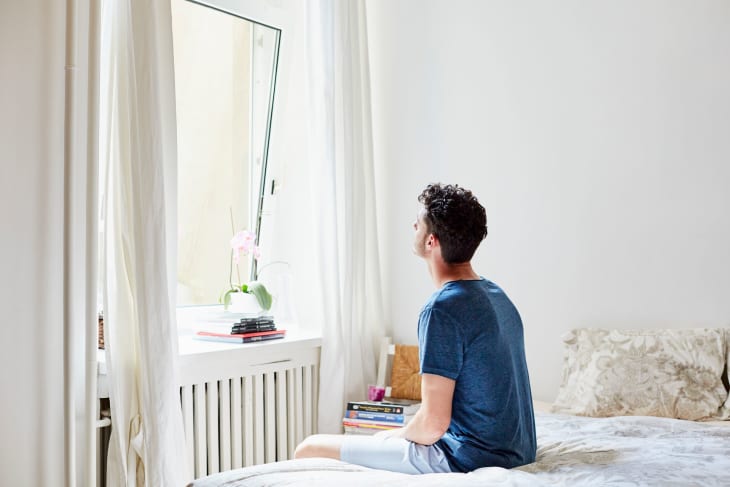How to Take Care of Yourself When Father’s Day Is Hard

For 39 years, Father’s Day was one of my most favorite days of the year. I loved watching my dad’s face whenever he’d see a stack of gifts. “For me,” he’d say with exaggerated glee before he’d spend what seemed like a ridiculous amount of time meticulously removing each and every piece of tape so he could save the wrapping paper (and extend his present-opening joy).
The man—a hard-working cardiologist turned expert biscotti baker/biker after he retired—loved presents more than anyone I’ve ever met. And, for the last 11 years since he died of brain cancer, I can say without hesitation that I’d do anything to give him one more gift.
At the same time, I don’t dread Father’s Day. In fact, I always make sure my father-in-law receives a special gift and that my son, now 13, helps make the day special for my husband by helping to make his favorite breakfast accompanied by a pile of presents from the heart. Still, it’s natural for your heart to hurt on days like this, whether your father has died, or you feel disconnected or estranged from him.
So what’s the best way to handle this complicated holiday? We tapped an expert for some advice: Andrea Bonior, PhD, is a licensed clinical psychologist and author of Baggage Check, an advice column that now includes a weekly live chat about mental health and relationships. I know I’m going to heed her advice to make this year just a little bit better. Or maybe I’ll just bake a batch of biscotti in my father’s honor.
1. It’s OK to grieve—even on a holiday
Father’s Day can trigger intense moments of grief, even if it’s been years since your father has passed away—but those moments can be life-changing. “Grief has meaning because grief is the flip side of love,” Bonior says. “It’s the price we pay for love.”
2. It’s OK to look at Father’s Day differently this year
If you’re dreading Father’s Day and plan to hole up at home instead of seeing all those happy families toasting the patriarch somewhere fancy, try and reframe these feelings. “This can be a powerful time to reassess your father’s meaning to you,” Bonior says. “It’s a great day to reassess the ways you carry him forward, the memories that are important that you want to prioritize and the ways you will keep your relationship alive even if he’s not alive.”
3. It’s OK if your feelings about your dad are a mixed bag
There’s meaning in even the most complicated feelings you have about your dad, Bonior says. “It’s important to allow yourself to feel even the most negative things,” she says. “These feelings can make you understand yourself better.” For example, think about how your lousy relationship has helped you in your life. “Maybe it helped you value good relationships more because you know what you do need,” she says. “Maybe you developed certain strengths from having to be your own person outside a toxic relationship. The key is that even bad feelings can help you gain insight and help you move forward and reflect.”
4. It’s OK to honor your dad even if it’s weird
Paying homage to your dad is your prerogative even if it seems odd from the outside looking in. So don’t hesitate to make your dad’s favorite meal, watch his favorite TV show, make a list of all that you loved about him or share his favorite joke with friends. “By doing this you’re sharing your dad as a real person and you’re keeping his memory alive which can be very important in helping you cope with a loss,” Bonior says.
5. It’s OK to flat-out ignore that it’s Father’s Day
Each person copes with holidays like this in different ways and avoiding the holiday entirely is just fine provided you’re not feeling worse by avoiding it. “You don’t want to stuff your feelings and explode in a week,” Bonior says. And if you think you’ll be upset looking at social media, skip it. “You don’t need to see all those photos on Facebook or Instagram,” she says. “As long as it feels functional, it’s okay. Just be sure to keep your finger on the pulse of your feelings.”
6. It’s OK to reach out for support when you need it
If you’re trying to psych yourself up for Sunday and aren’t sure you’ll be fine that day, communicate your needs to your partner or friends. “The more notice you give your partner, the better,” Bonior says. “You should spell it out as in ‘I might need space on Sunday. Father’s Day is hard for me as you know.'” If you have kids, you can also acknowledge that this day can be complicated. “Let’s say your kids are doing this huge Father’s Day celebration but your husband recently lost his dad,” she says. “You can say something like ‘Daddy is going to be excited to spend the day with you, but you should know that Daddy is feeling sad because he’s missing Grandpa on Father’s Day, too.’ The more notice you can give to your loved ones, the less of a chance there will be for dashed expectations.”
This post was last updated on 6.12.19 — TW